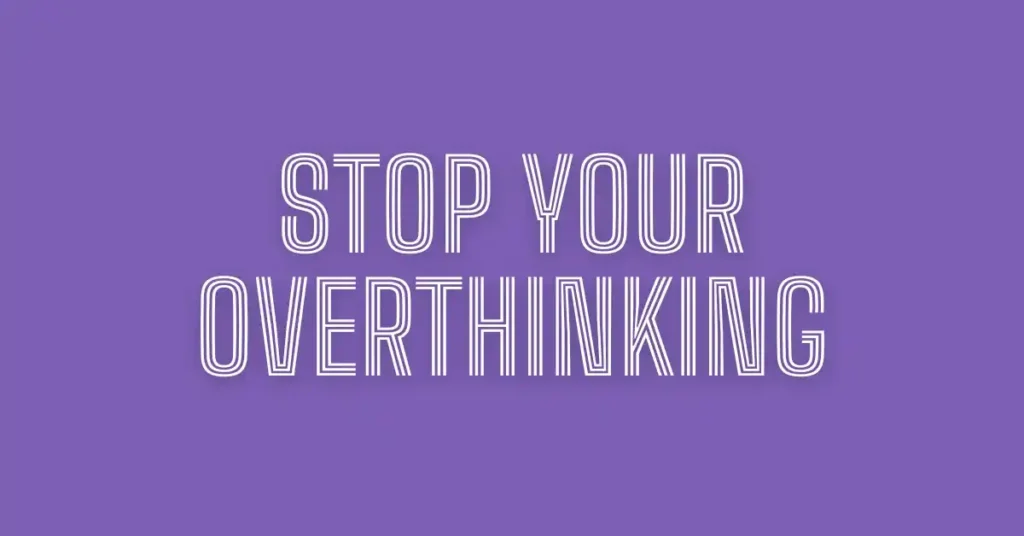Introduction
Are you caught in a never-ending cycle of what-ifs and worst-case scenarios? Do you find yourself replaying past events or obsessing over future possibilities? If so, you’re not alone. Overthinking is a common mental habit that can significantly impact our mental health and overall well-being. But here’s the good news: with the right strategies how to stop overthinking, you can break free from this pattern and regain control over your thoughts. In this comprehensive guide, we’ll explore what overthinking is, why it happens, and most importantly, how to stop it in its tracks.
What is Overthinking?
Overthinking, an excessive degree of dwelling on negative thoughts, can lead to problems such as rumination, worry, and analysis paralysis. This excessive thinking can result in focusing on past events or current issues without finding a solution, leading to inaction and potential issues.
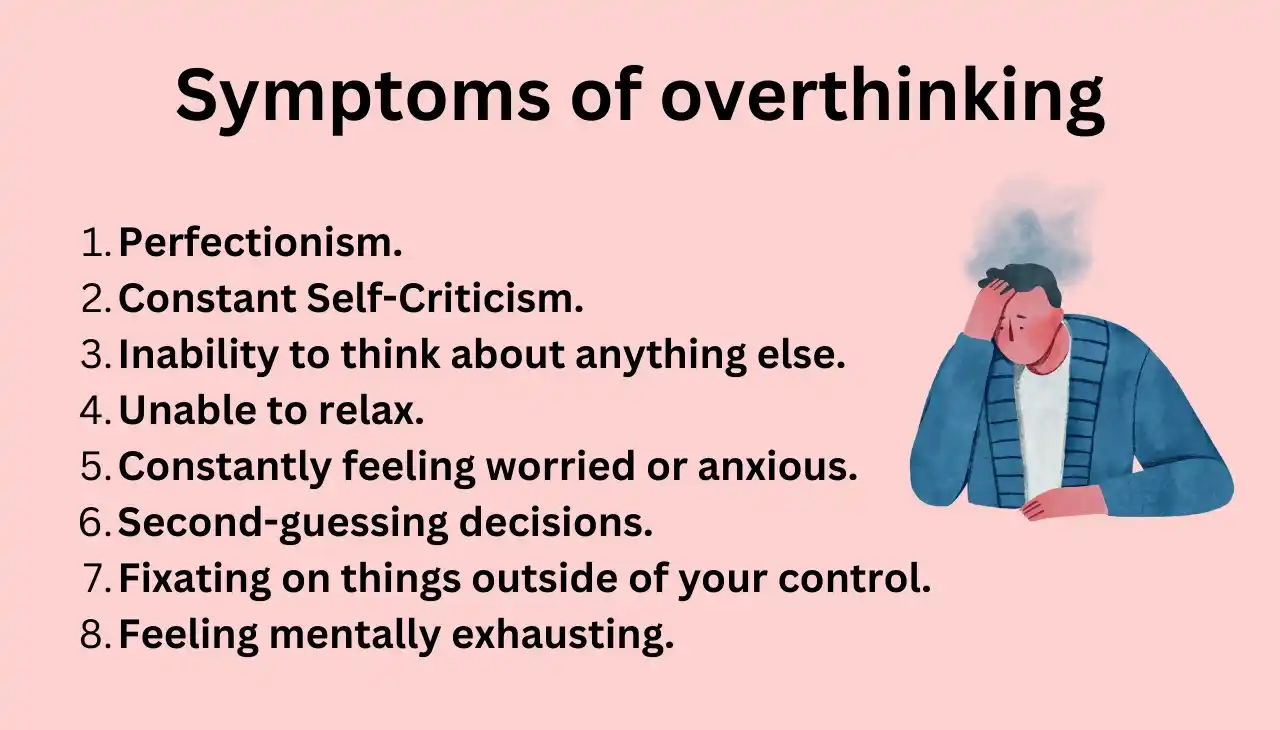
Symptoms of overthinking
Overthinking can be a symptom of several underlying issues, often related to mental health. Here are some common causes:
- Anxiety Disorders: Overthinking is frequently associated with anxiety disorders, such as Generalized Anxiety Disorder (GAD). People with GAD tend to worry excessively about various aspects of their lives.
- Depression: Overthinking can also be a symptom of depression. Individuals with depression may ruminate on negative thoughts and past events.
- Stress: High levels of stress can lead to overthinking as the mind tries to process and manage the stressors.
- Perfectionism: Those with perfectionist tendencies may overthink to ensure everything is perfect, leading to excessive worry and analysis.
- Post-Traumatic Stress Disorder (PTSD): Overthinking can be a hallmark of PTSD, a condition in which people constantly relive unpleasant experiences.
- Obsessive-Compulsive Disorder (OCD): People with OCD may overthink as part of their compulsive behaviors, constantly analyzing and rechecking things.
If you find that overthinking is significantly impacting your daily life, it might be helpful to speak with a mental health professional who can provide guidance and support.
How to stop your negative overthinking
Negative overthinking can be quite challenging, but there are several effective strategies to help manage and reduce it:
- Find a Distraction: Engage in activities you enjoy, such as cooking, exercising, or picking up a new hobby. This might help you refocus your attention away from unpleasant ideas.
- Practice Deep Breathing: Deep breathing exercises can calm your mind and reduce the physical effects of overthinking. Try sitting comfortably, relaxing your neck and shoulders, and breathing slowly through your nose.
- Meditate: Regular meditation can help clear your mind and reduce nervous chatter. Even just 5 minutes a day can make a difference.
- Stay Present: Concentrate on the current moment rather than thinking about the past or future. Mindfulness methods might help you remain grounded.
- Challenge Negative Thoughts: Identify and challenge your negative thoughts by replacing them with more realistic and positive ones.
- Take Action: Break down your worries into actionable steps. This might give you a sense of control and reduce feelings of overwhelm.
- Seek Support: Talking to a friend, family member, or mental health professional can provide you with support and new perspectives.
- Be Kind to Yourself: Practice self-compassion and remind yourself that it’s okay to have negative thoughts occasionally. The trick is to not allow them to dominate you.
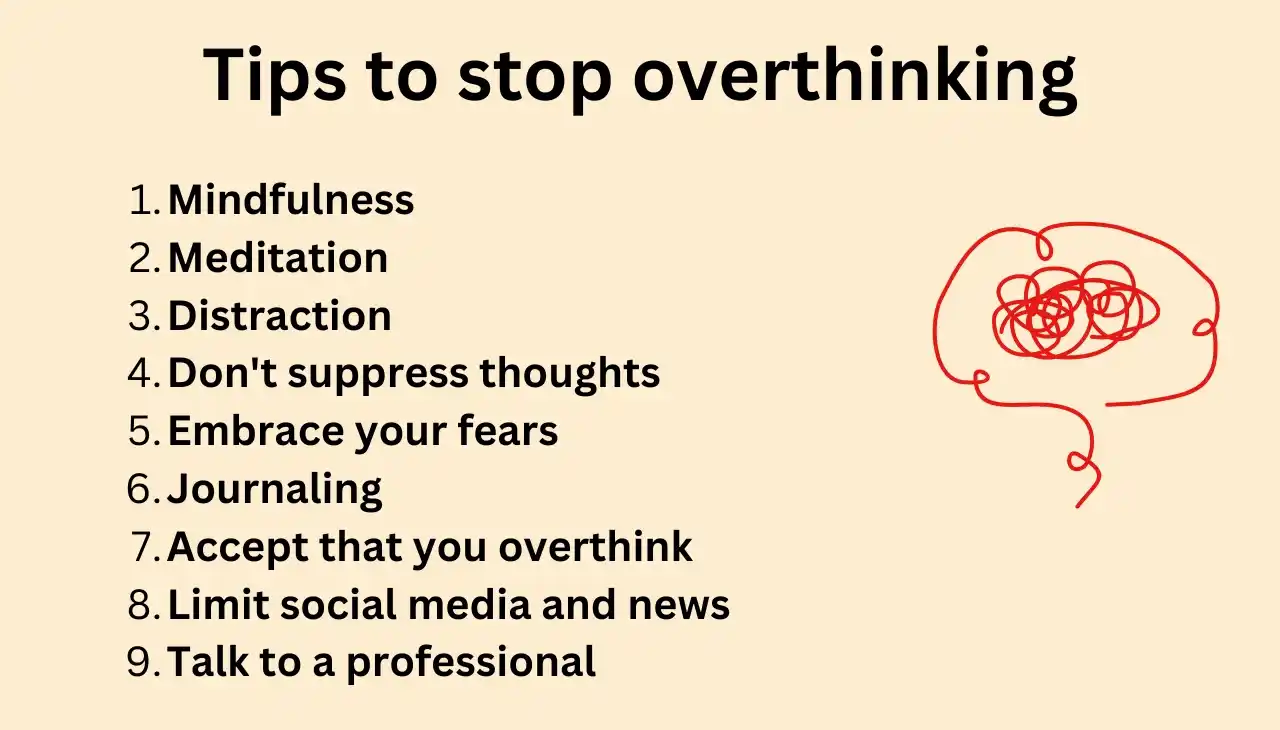
How to stop overthinking about your relationships
Overthinking in relationships can be particularly stressful, but there are several strategies to help manage it:
- Open Communication: Talk openly with your partner about your concerns and anxieties. Clear communication can help you understand each other better and reduce misunderstandings.
- Mindfulness Practices: Engage in mindfulness exercises like meditation or deep breathing to stay present and reduce anxiety.
- Challenge Negative Thoughts: Recognize and fight your negative ideas. Consider if they are founded on facts or assumptions.
- Focus on Self-Care: Engage in activities that make you feel good about yourself. This can include doing hobbies, exercise, reading, or spending time with your friends.
- Set Boundaries: Establish healthy boundaries in your relationship to ensure both partners feel respected and valued.
- Seek Support: Consider talking to a therapist or counselor who can provide professional guidance and support.
- Reflect on Triggers: Understand what triggers your overthinking and work on addressing those root causes.
- Practice Gratitude: Focus on the positive aspects of your relationship and express gratitude for them.
Stop your overthinking at night
Overthinking at night can be particularly disruptive, but there are several strategies you can try to help calm your mind and improve your sleep:
- Establish a Bedtime Routine: Create a consistent pre-bed routine to signal to your body that it’s time to wind down. This may be reading, having a warm bath, or doing mild yoga.
- Limit Screen Time: Reduce screen time at least one hour before bedtime. The blue light from devices might disrupt your sleep cycle.
- Practice Deep Breathing: Deep breathing exercises can help calm your mind and body. Inhale for 4 seconds, then hold for 7 seconds before expelling for 8 seconds.
- Write It Down: Keep a journal by your bed to jot down any worries or thoughts that are keeping you awake. This can help clear your mind and reduce the urge to overthink.
- Mindfulness and Meditation: Engage in mindfulness or meditation practices to help focus your mind on the present moment and reduce anxiety.
- Progressive Muscle Relaxation: This technique entails tensing and then gently releasing each muscle group in your body, beginning with your toes and progressing to your head.
- Create a Comfortable Sleep Environment: Keep your bedroom cold, dark, and quiet to promote good sleep.
- Limit Caffeine and Alcohol: Avoid coffee and alcohol close to bedtime since they might disrupt your sleep.
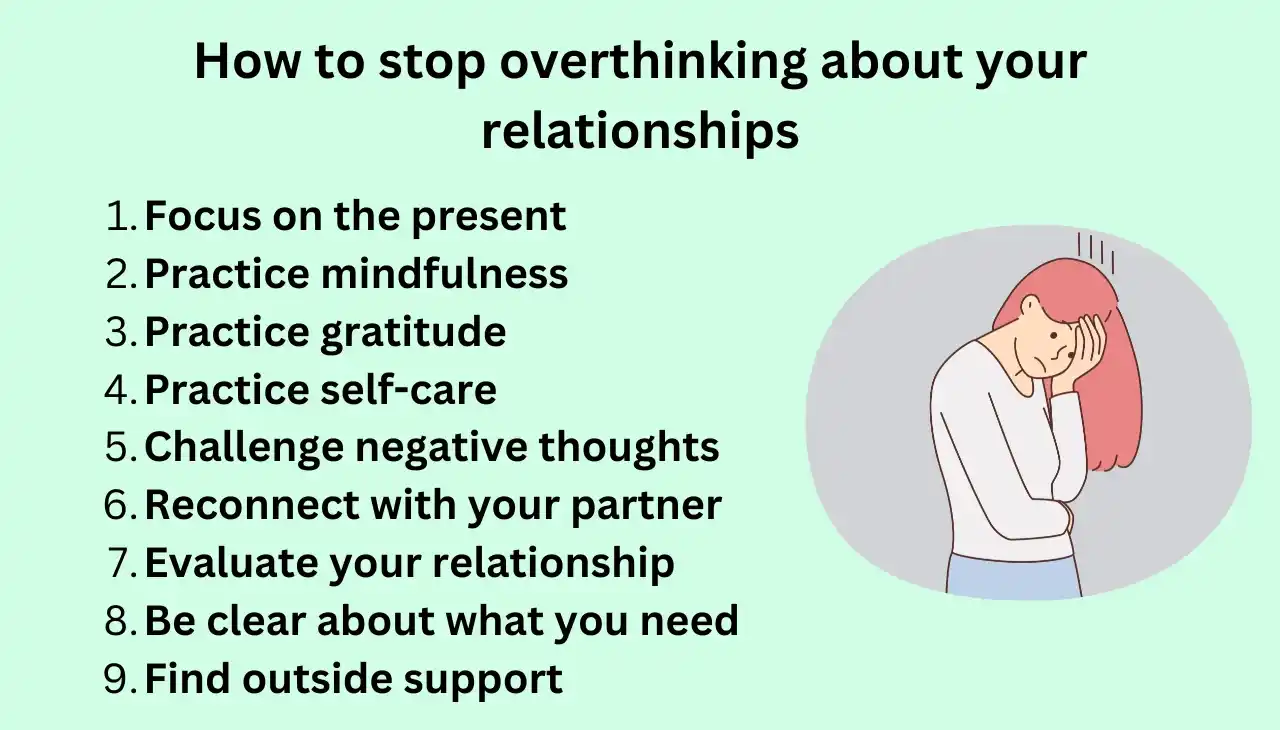
Stop overthinking in anxiety
Managing overthinking, especially when it comes to anxiety, can be challenging but very achievable with the right strategies. Here are some effective methods:
- Practice Mindfulness: Engage in mindfulness exercises like meditation yoga or deep breathing to help stay present and reduce anxiety.
- Challenge Negative Thoughts: Recognize and fight your negative ideas. Consider if they are founded on facts or assumptions.
- Limit Caffeine and Sugar: These can raise your anxiety levels. Opt for a balanced diet to help stabilize your mood.
- Exercise Regularly: Physical activity can help reduce anxiety by releasing endorphins, which are natural mood lifters.
- Set Aside Worry Time: Set aside a set period each day to worry. This can help contain your anxiety to a manageable timeframe.
- Stay Connected: Talk to friends, family, or a therapist about your worries. Sometimes, just sharing your thoughts can help reduce their intensity.
- Focus on What You Can Control: Direct your energy towards things you can influence and let go of what you can’t.
- Practice Self-Compassion: Be kind to yourself and recognize that it’s okay to have anxious thoughts. The trick is to not allow them to dominate you.
Tips to stop overthinking
- Grounding Exercises for Overactive Thought Relief
- Engage senses to bring the mind back to the present moment.
- Use the 5-4-3-2-1 Technique: Identify 5 things, 4 things to touch, 3 things to hear, 2 things to smell, 1 thing to taste.
- Scheduled Worry Time: A Unique Approach to Managing Intrusive Thoughts
- Set aside specific time and duration for worry sessions.
- Jot down and save worries during the day.
- Engage fully with concerns during the scheduled session.
- Put worries aside and focus on other activities.
- Helps contain worries and prevents them from dominating the day.
- Mindfulness and Deep Breathing Techniques to Reduce Overthinking
- Mindfulness practices manage overthinking by creating space between thoughts.
- Simple Deep Breathing Exercise: Inhale, hold, exhale, repeat for 5-10 cycles.
- Regular practice reduces overthinking frequency.
- Cognitive Behavioral Therapy (CBT) for Overthinking
- CBT is a therapeutic approach addressing overthinking.
- Techniques include:
- Thought records: Recording thoughts and examining evidence.
- Cognitive restructuring: Replacing negative thoughts with balanced alternatives.
- Behavioral experiments: Testing fears in real-life situations.
- Consider working with a CBT-trained therapist for personalized guidance and support.
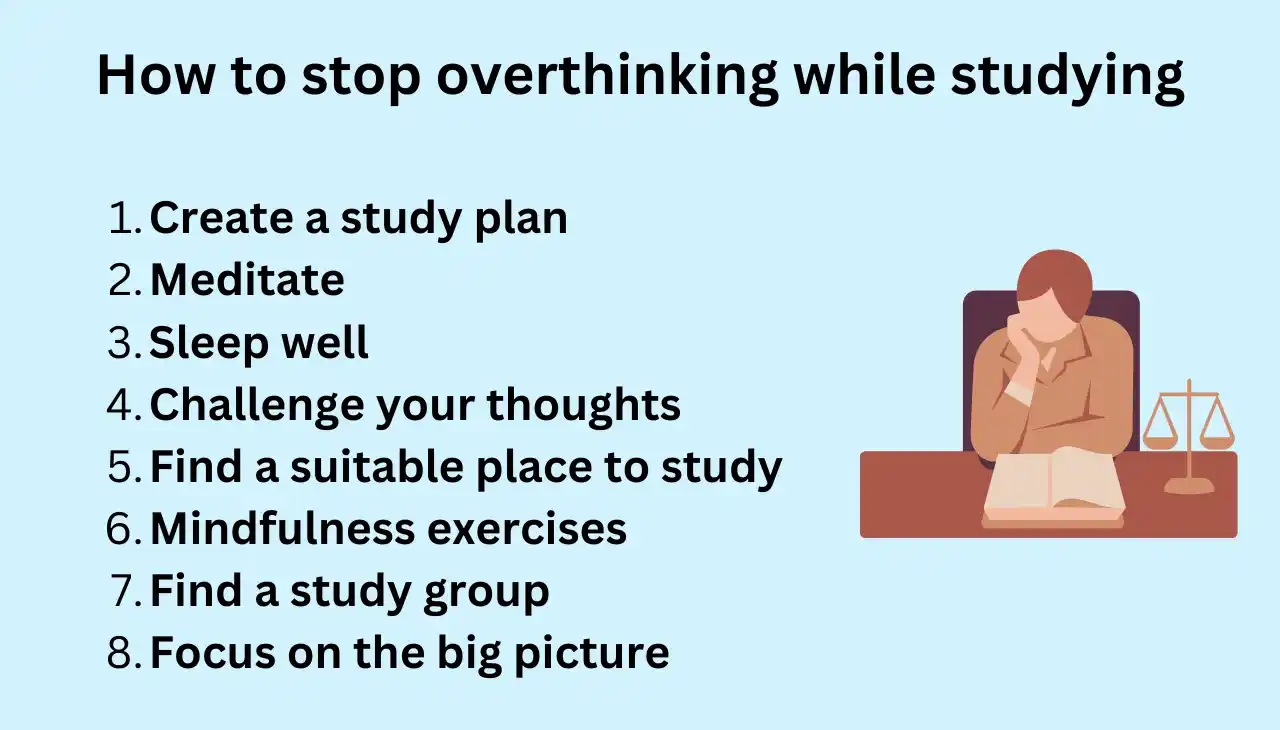
- Healthy Distractions: Engaging in Joyful Activities
- Engage in hobbies that bring joy.
- Exercise or play sports.
- Spend time in nature.
- Connect with friends or family.
- Learn a new skill or language.
- Aim is not to avoid thoughts, but to give mind a break from constant analysis.
- Practicing Self-Compassion: Cultivating Kindness amidst Overthinking
- Overthinking can lead to self-criticism.
- Self-kindness involves treating oneself with care like a friend.
- Recognizing common humanity acknowledges everyone’s struggles and mistakes.
- Mindfulness entails monitoring thoughts and emotions without judgment.
- Shifting perspective can ease overthinking.
- Seeking Support for Overactive Thinking Habits
- Seek help from reliable friends and relatives.
- Join a support group for anxiety or overthinking.
- Consider seeing a therapist or counselor.
- Engage in online communities focused on mental health and personal growth.
- Sharing thoughts with others can lead to new insights and coping strategies.
- Confronting Negative Narratives Through Journaling Practice Against Overanalysis
- Journaling provides clarity and perspective.
- It allows externalization of worries and objective examination.
- Journaling prompts for overthinking include assessing worst-case scenarios, evidence, future perspectives, and friend-related responses.
- Regular journaling helps identify patterns and develop balanced perspectives.
- Combating Overthinking: Transformative Steps
- Break down enormous ambitions into smaller, more doable activities.
- Set a timer for decision-making to avoid analysis paralysis.
- Practice the “two-minute rule”: do tasks less than two minutes immediately.
- Challenge yourself to act on one of your worries daily.
- Remember, progress is more important than perfection. Each action towards a balanced life is a step away from overthinking.
- Gaining Perspective: Shifting Focus Towards Life’s Journey
- Practice thankfulness by naming three things you’re grateful for every day.
- Volunteer or help others to shift focus away from personal worries.
- Imagine how your current concerns might be viewed in the future.
- Ask yourself if this matter will matter in five years.
- Regularly consider the broader context of life to reduce the power of minor worries.
Conclusion
Overthinking is a complex issue that requires patience, practice, and self-compassion. It is a journey that requires consistent application of powerful strategies. By choosing techniques that resonate with you and incorporating them into your daily routine, you can build a toolkit for managing overthinking. This will lead to a calmer mind, clearer decisions, and improved overall well-being. With persistence and the right strategies, you can break free from the cycle of overthinking and cultivate a more balanced, peaceful state of mind. Start your journey to a calmer, more grounded person today.
FAQ
Is overthinking the same as anxiety?
While overthinking and anxiety are related, they're not exactly the same thing. Overthinking is a mental habit of excessive worrying or rumination, which can be a symptom or trigger of anxiety. Anxiety, on the other hand, is a broader mental health condition that involves persistent feelings of worry, fear, or unease, often accompanied by physical symptoms like increased heart rate or sweating. Many people who overthink experience anxiety, and those with anxiety disorders often struggle with overthinking. However, it's possible to be an overthinker without meeting the clinical criteria for an anxiety disorder. If you're concerned about anxiety, it's best to consult with a mental health professional for a proper diagnosis and treatment plan.
How long does it typically take to see results when trying to stop overthinking?
A person's time to reduce overthinking varies greatly, depending on factors such as the severity and duration of the habit, commitment to consistent practice, specific strategies, and any underlying mental health conditions. Some people may see improvements within weeks, while others may take several months to see significant changes. It's important to be patient and persistent in your efforts, even celebrating small improvements. If no changes are seen after months of consistent effort, consulting a therapist or counselor can provide personalized guidance and support.
Can medication help with overthinking?
Overthinking, a severe mental health condition, can be treated with prescribed medications like SSRIs, SNRIs, and Benzodiazepines. These medications are often prescribed for conditions like anxiety disorders or depression, but they should not be the first line of treatment. It is essential to consult a qualified healthcare professional to ensure the medication is appropriate for your specific situation. Combining medication with therapy and lifestyle changes is recommended, rather than using it as a standalone solution. Consultation with a doctor or psychiatrist can help determine the appropriate medication for your specific situation.
How can I help a friend or family member who is an overthinker?
Overthinking can significantly impact an individual's journey towards a calmer mind. Supportive measures can include listening without judgment, validating their feelings, encouraging professional help, sharing resources about overthinking and coping strategies, practicing patience, modeling healthy thinking, engaging in enjoyable activities together, and avoiding reinforcing their overthinking. By providing a safe space for them to express their thoughts and feelings, they can develop a calmer mind. It is crucial to avoid lengthy discussions that feed into their overthinking patterns and to encourage the individual to take steps to manage their overthinking. Remember, it is up to the individual to take action and respect their autonomy in the process.
Can overthinking be beneficial in any way?
Overthinking can lead to negative consequences, but it can also offer potential benefits when managed carefully. Deeper thinking can enhance problem-solving, creativity, empathy, preparation, and self-awareness. Careful consideration of problems from multiple angles can lead to more thorough solutions. However, it's crucial to maintain a balance to avoid excessive rumination. Channeling analytical tendencies into constructive problem-solving or creative pursuits can help make the most of this trait. If overthinking is causing more harm than good, it's essential to implement strategies to maintain a balanced, productive way of thinking. The goal is to think in a balanced, productive way, not to stop thinking deeply altogether. By focusing on these aspects, individuals can harness the potential benefits of deep thinking without causing unnecessary harm.
